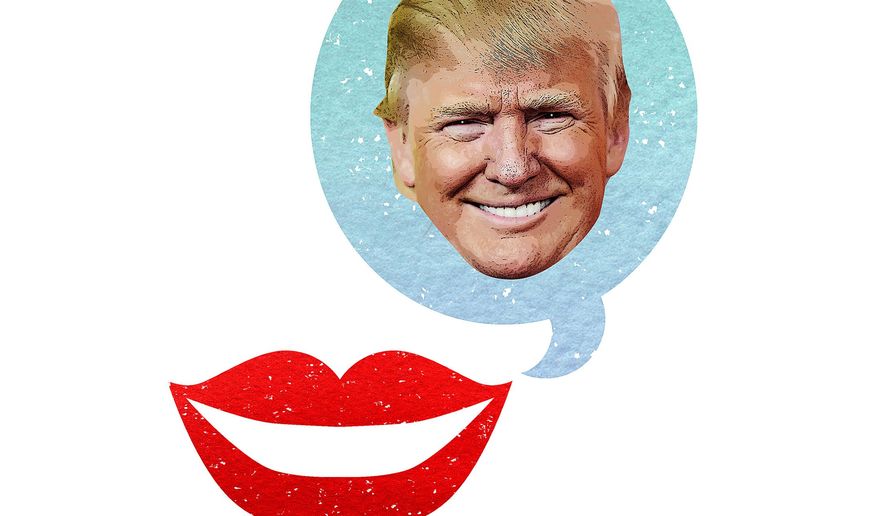OPINION:
Information theory better explains America’s confounding current politics than does conventional analysis. Such an approach more than simply aids in grasping increasingly nontraditional politics. It allows the separation of today’s important content from its discordant form.
It is a serious oversight to isolate current disruptive politics into its most vocal and successful practitioner. Donald Trump the messenger and Donald Trump the message are different phenomena. The rush to dismiss the former means ignoring the latter. This outcome is a huge mistake because the real message of President Trump’s election is that American politics has been changing for some time. Donald Trump the messenger is not the cause, but the effect, of this change.
The economist George Gilder is in the forefront of unraveling information theory’s crucial role in capitalist development. Development arises from a low-entropy (minimally distorted) medium delivering high-entropy (majorly disruptive) messages. Without both medium and message playing their parts, economic advancement suffers:
“[I]t takes a low-entropy carrier (no surprises) to bear a high-entropy message (creative surprises and inventions) Low-entropy carriers with no surprises allow the message to be distinguished from the medium at its destination. Order, which is expressed in law, tradition, predictable politics, stable families, and reliable currencies, is necessary for an innovative society full of unexpected discoveries.”
Information theory’s insight also applies for America’s recent political developments.
U.S. politics is a low-entropy carrier par excellence. From Constitution to campaigns, it offers a relatively unchanging, respected and accepted, regularized and reliable medium for transmitting America’s civil disagreements for resolution.
Even at its most disruptive — when third parties try to crash the two-party party — the system prevails. At most, third parties affect presidential outcomes between the two major parties (as in 2000 and 1992). No third party has won a single electoral vote since 1968, nor any third party won a presidential election in more than 150 years.
Occasionally, the messages our political system delivers are high-entropy ones. The nation tends to internalize these, while fixating instead on their messengers. The result is a seemingly seamless course of political history that appears almost organic, rather than political, when viewed over any distance of time.
Donald Trump’s election appears to many to have altered American politics’ proper functioning. In information theory’s parlance, Mr. Trump has reversed the role of medium and message. A highly disruptive messenger, he is blocking the transmission of necessary political communication.
Instead, the reverse is true. Rather than a short-term distortion, Mr. Trump is the latest and loudest signal America’s political system has been transmitting for some time.
For half a century, the two parties’ establishments have faltered in the roles of messengers and message. Increasingly, they can only win nominations, not general elections. Instead, the role of “outsider” — nonestablishment politician — is coveted in November.
Barack Obama, George W. Bush, Bill Clinton, Ronald Reagan and Jimmy Carter all successfully seized the outsider mantle from their general election opponents. All but Mr. Carter were re-elected. Conversely, George H.W. Bush in 1988 was the last “insider” to win. For Democrats, it has been even longer: Lyndon Johnson in 1968.
The outsider trend has only picked up momentum as America’s economy has sputtered. The appeal of those even more outside the traditional party establishment has grown over the last 16 years.
From 1946 to 2000, U.S. gross domestic product (GDP) averaged 3.3 percent real growth annually. From 2001 to 2008, it averaged just 2.1 percent. In 2008, Barack Obama, a first-term senator in just his second year in office, upset the heavy establishment favorite, Hillary Clinton, and then defeated the Republican Party’s establishment nominee, Sen. John McCain. Not simply a relative outsider compared to his opponents, Mr. Obama was arguably the most liberal president in America’s history.
From 2009 to 2016, U.S. GDP averaged just 1.5 percent real growth. Last year, the nation opted for outsiders even more. Mr. Trump devastated a Republican field loaded with establishment politicians. Among Democrats, only the party establishment’s rules allowed Hillary Clinton’s nomination over the outsider, Sen. Bernie Sanders. In November, Mr. Trump won one of presidential elections’ greatest upsets as perhaps America’s most outsider president.
Those seeing Mr. Trump or Mr. Sanders or Mr. Obama — as aberrations miss the trend stretching back in American politics and apparently gaining strength. Outsiders, even Mr. Trump, are not the disrupters to the message that they appear. They are the message.
The message is that American politics has transformed. The two parties’ roles have changed. While the two parties used to be both messenger and message, they have become largely relegated to the role of medium today.
In information theory terms, they are now the low-entropy carriers through which America transmits its political message. And the message they most commonly transmit is no longer their own respective political establishment’s, but outsiders’ speaking through them.
Those believing the party establishments will shortly reclaim the messenger and message roles are likely wrong. Instead, expect them to continue serving as transmitters of America’s rejection of their message. The outsider message both parties are now transmitting in louder volumes is that traditional politics is no longer working. Or at least, it is no longer winning.
• J.T. Young served in the Treasury Department and the Office of Management and Budget and as a congressional staff member.




Please read our comment policy before commenting.